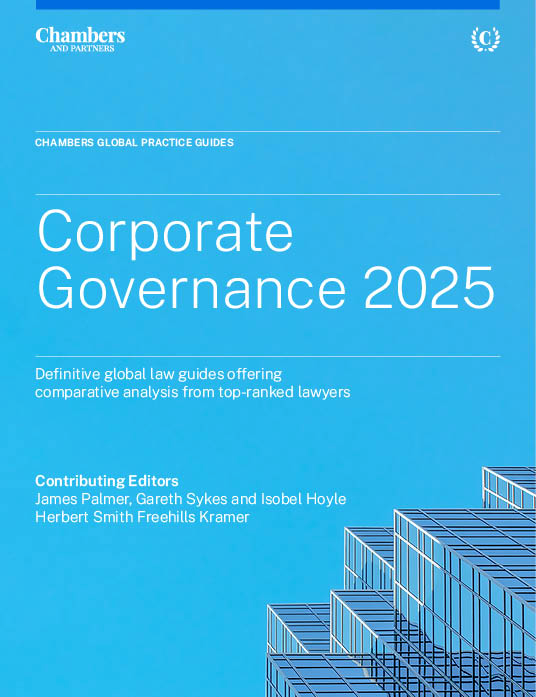
Corporate Governance 2025
The Corporate Governance 2025 guide covers close to 40 jurisdictions. The guide provides the latest legal information on environmental, social and governance (ESG) considerations; decision-making processes; board structure and composition; legal duties of directors/officers; the role of shareholders; corporate reporting; and audit, risk and internal controls.
Last Updated: June 17, 2025
Compare law and practice by selecting locations and topic(s)
Select Locations

Select Topic(s)

Please select at least one location and one topic to use the compare functionality.
Governance in 2025 – Time for a Radical Rethink?
As we set out in our introduction to this Guide last year, 2024 was the year of the election. According to Time Magazine, almost two billion people headed to the polls in 2024, with elections held in over 60 countries (and the EU). By the end of 2024, many incumbent governments had been replaced and many of those which remained in power did so with significantly reduced majorities. The political upheaval of 2024 was therefore a continuation of the volatility we have seen so far this decade arising from the COVID-19 global pandemic, multiple conflicts and global energy crisis. Now that the dust has settled after the elections and the new administrations have taken up office, it seems an appropriate time to consider whether this volatility, and its impact in the world of governance, will continue into 2025.
It is obviously still early days but there are signs that a number of administrations are, at varying speeds and to varying degrees, taking the opportunity to shake up the system. Some are engaged in discussions about how to reshape radically the regulatory landscape in a bid to drive growth, increase productivity and harness the possibilities offered by emerging technology. To respond to this, companies need good leadership and robust governance structures and procedures.
Reducing Regulation to Boost Growth
The COVID-19 pandemic and the measures introduced to try and contain its transmission, had a profound impact on the global economy. Entire industries were shut down or had to adopt new practices, resulting in significant sectors of the global workforce that were unable to perform their jobs in the usual way, or even at all. Supply chains were thrown into chaos as transport routes were disrupted and consumer habits changed overnight. And governments deployed huge sums of money in efforts to protect their citizens’ economic livelihoods and health (through containment and immunisation initiatives).
In the aftermath of the pandemic, governments are now facing the dual challenge of regenerating their economies, and servicing the debt accumulated in their COVID-19 response. In a bid to boost growth, governments are exploring how regulation, in governance and other aspects, may be adding to the cost of running businesses and stifling innovation. In the UK for example, the new Labour government is working with regulators to identify areas where regulation can support its growth mission, both through removing obstacles to business efficiency and utilising innovation to drive it. Regulators which have been tasked with reviewing their current rulebooks include the Financial Services Authority and the Competition and Markets Authority.
In an EU context, Mario Draghi, the former European Central Bank chief, published a report on the future of European competitiveness in September 2024. The report, which will inform the EU Commission’s political guidelines for 2024 to 2029, looks at how to boost sustainable growth, identifies key barriers preventing Europe from reaching its full potential and presents a new industrial strategy for the EU.
Looking to the US, there has been much attention on initiatives being introduced by the US government to reduce the level of regulation and perceived bureaucracy, in a bid to drive US economic growth and prosperity. An early example of these initiatives is the decision of the US Securities and Exchange Commission (SEC) to cease its defence of the rules that it had proposed in relation to climate-related disclosures by listed entities. Having been adopted by the SEC in 2024, the rules had been challenged by various interested parties on account of the anticipated burden they would place on in-scope companies and the potential for conflict between the US rules and climate-related disclosure requirements in other jurisdictions, and were subject to judicial review. The decision of the SEC to cease its defence means that these disclosure obligations are unlikely to survive under the current US government, although California and other US states have continued to regulate climate reporting at the state level. More broadly, the newly established Department of Government Efficiency has been tasked with looking at federal spending and making recommendations for reform.
While companies will no doubt welcome a reduction in their regulatory burden, boards may at times also consider whether any of the measures being revised remain beneficial in the context of their companies’ specific strategies and culture. The views and interests of key stakeholders in the company will be fundamental in this assessment.
Reducing the Reporting Burden
Corporate reporting is an aspect of the governance landscape which many jurisdictions are currently evaluating, to ascertain whether the correct balance is being attained. On the one hand, there are the benefits of transparency for shareholders and other interested stakeholders (including regulators and wider market participants) but against that the costs of monitoring, gathering and disseminating this information need to be factored into the equation. Candid consideration of costs of transparency has not been a primary consideration in expanded governance transparency for some years. A well-balanced system will aim to deliver decision-useful information to the relevant stakeholders, without imposing disproportionate costs or stifling entrepreneurialism. It will also need to be kept under regular review to ensure that a reasonable balance is maintained.
Narrative, non-financial disclosures have in recent years added significantly to the volume and complexity of the reporting obligations placed on companies, particularly in the area of environmental, social and governance (ESG) reporting. There are initiatives in place in a number of jurisdictions to re-evaluate these obligations and assess whether an appropriate balance is currently being achieved.
In the UK, the government is continuing with the review of non-financial reporting requirements, which was launched by the previous government towards the end of its term in office. A number of changes have already been introduced which are aimed at, or will have the effect of, reducing the disclosures expected by companies. For example, companies are only subject to certain reporting requirements if they meet prescribed size thresholds, with the effect that the greatest level of disclosure is expected from the companies with the largest employee headcount, turnover and balance sheet totals. From April 2025, the monetary thresholds used for the classification of companies have been increased by approximately 50%, which according to the government will result in up to 132,000 companies moving to a smaller size category. This is substantially larger than the increase which was introduced to the equivalent EU monetary thresholds in 2024. Certain disclosures viewed as being unnecessary or duplicative are also being removed from the directors’ report and the directors’ remuneration report which make up part of the annual report and accounts companies need to produce each year under the UK reporting regime.
It seems to us there is significant scope for further lightening of reporting burdens – the momentum to the removal of regulatory burden in financial services regulation is materially further progressed than that for wider corporate reporting – if UK Prime Minster Keir Starmer’s commitment to removing 25% of the cost of regulation for businesses is to be achieved in the near future.
In Australia, the adoption of the Fifth Edition of the ASX Corporate Governance Principles and Recommendations, which was expected to apply to listed entities in place of the Fourth Edition for financial years commencing on or after 1 July 2025, was cancelled in February this year. The updated edition would have introduced significant changes, including to embrace the importance of a company’s relationship with its shareholders and of board and workforce diversity. Aspects of the draft Fifth Edition were negatively received by certain parts of the governance ecosphere, and ultimately the ASX Corporate Governance Council, the independent body charged with drafting the updated edition, was unable to agree a final text. The Fourth Edition, published in 2019, therefore remains in place as the standard to be applied.
The amendments made to the EU monetary thresholds in 2024 lifted a number of companies out of the scope of the Corporate Sustainability Reporting Directive (CSRD), as well as other EU reporting requirements. However, the EU Commission is proposing amendments to the size thresholds in the Omnibus Package which would have a greater impact on the applicability of the CSRD and the EU Taxonomy for sustainable activities. Amongst the Omnibus proposals are measures which would significantly increase the size threshold based on employee numbers for determining applicability of these legislative instruments and would require that the employee number threshold should always be met (under the current approach any two out of the three threshold criteria need to be met to bring an entity in scope). As well as amendments to the thresholds for applicability, the Omnibus package also contains measures to simplify the EU’s sustainability framework (which is highly technical and which many organisations have struggled to implement) and measures have already been passed to postpone the reporting requirements contained in the CSRD and Corporate Sustainability Due Diligence Directive (CS3D) for certain companies. Whilst the measures are broadly welcomed, proposing changes so soon after the framework has been adopted and, in the case of the CSRD, during its phased implementation, has caused uncertainty for companies, many of which have already dedicated significant resources in responding to these directives.
An aspect of reporting which can place additional strain on companies’ resources is the fragmentation of reporting frameworks adopted in different jurisdictions. This lack of cohesion is also detrimental to investors and other interested stakeholders as it makes it far harder to compare entities which are subject to different reporting regimes. The International Sustainability Standards Board (ISSB) was created in 2021, with a mandate to develop international sustainability disclosure standards. These standards are designed to operate for sustainability-related reporting in the same way as the IFRS framework operates for accounting standards. The ISSB issued the final form of its first two sustainability disclosure standards (ISSB Standards) in June 2023 and now individual jurisdictions are determining whether, and how, to incorporate these standards into their domestic reporting framework. It is hoped that the ISSB Standards will become as universally endorsed and applied as the IFRS’s accounting standards, which would assist entities operating in, and subject to the reporting requirements of, multiple jurisdictions.
Embracing Innovation
Governments can help to boost growth and economic performance by ensuring that businesses can take maximum advantage of technological tools to drive efficiency, and by removing unnecessary barriers to the deployment of these tools. Again, there are examples of governments exploring how to incorporate technological advancements into best corporate governance practices.
An example of such an initiative is the UK government’s stated plan to review the law relating to virtual annual general meetings (AGMs). Whilst relaxations were introduced during the COVID-19 pandemic to allow companies to hold their AGMs virtually, these relaxations were subsequently removed once restrictions on travel and gathering in groups were removed. In light of the experience during the pandemic, the UK government has announced that its push to modernise company law will include clarifying the law in relation to the legality of virtual AGMs. This is an approach already permitted in Australia, where companies can hold fully virtual AGMs if the company’s constitution permits this. The Australian Securities and Investments Commission (ASIC) maintains guidance for companies which sets out FAQs on fully virtual meetings and hybrid meetings, clarifying that the law does not mandate a particular meeting format. There are various factors a company would need to weigh up when deciding which meeting format is most suitable in its individual circumstances but introducing this flexibility, and removing the current uncertainty, would be a further step in modernising shareholder engagement and communication in the UK.
Whilst corporate governance initiatives may not grab all the headlines, there are steps being taken in many jurisdictions which will have a meaningful impact on how companies are managed and administrated. The summaries presented in this Guide for individual jurisdictions provide a clear overview of the corporate governance framework being applied in those jurisdictions and also highlight some of the hot topics and trends currently being seen. The Guide will therefore be a useful resource for companies as they navigate the regulatory landscape in the jurisdictions in which they operate.


